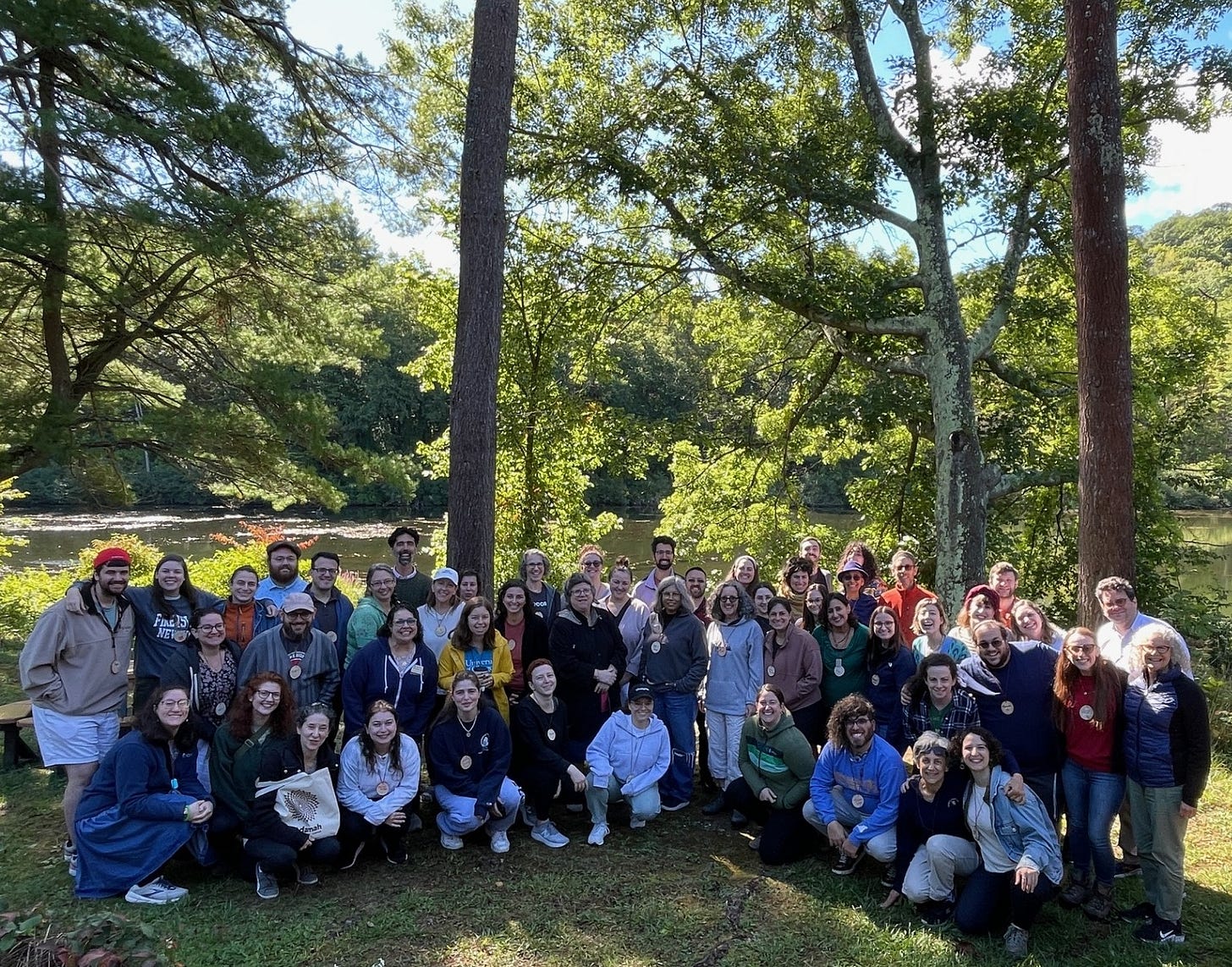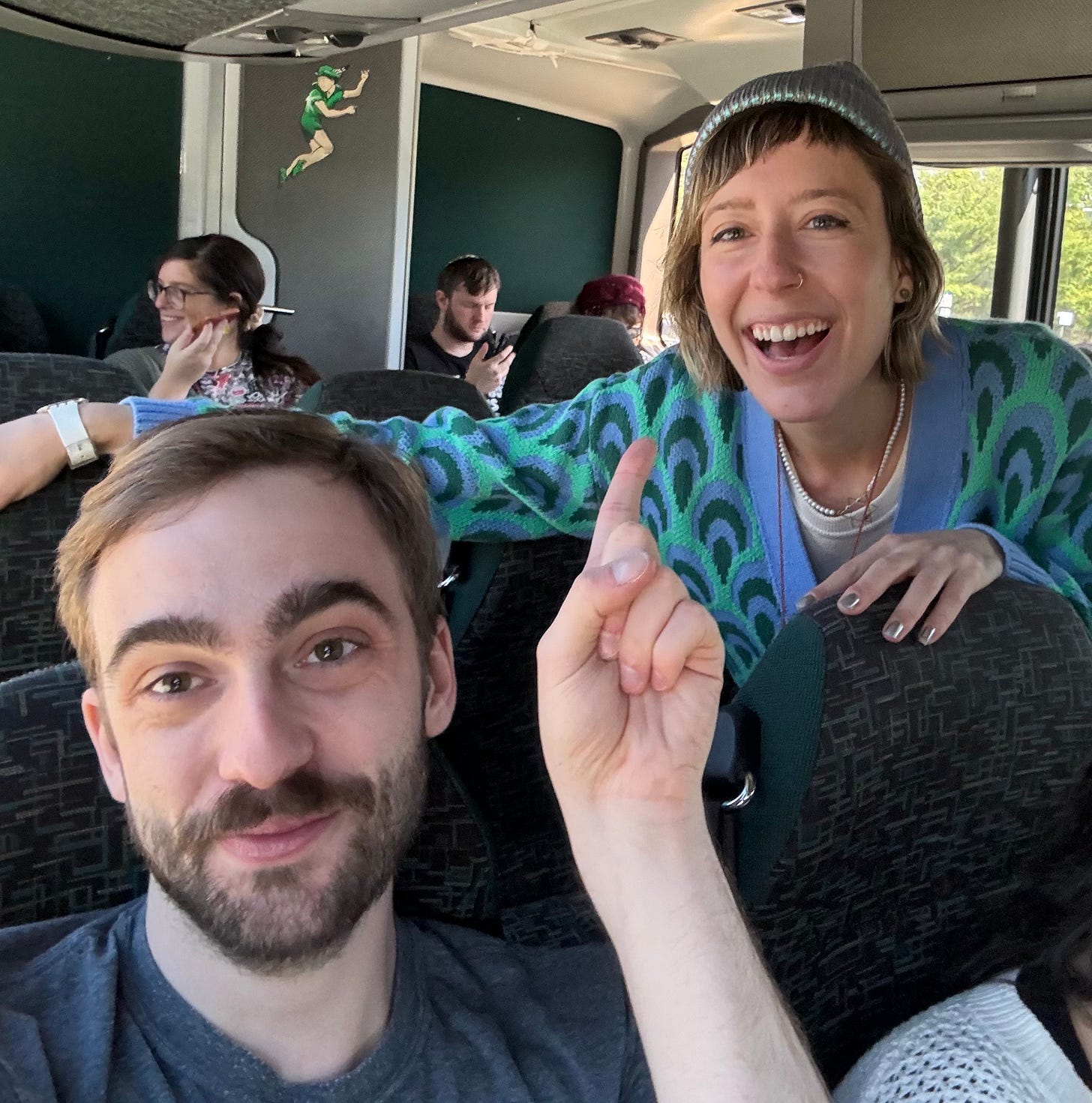From Manischewitz to Mindfulness: A Jewish Retreat!
Lessons from a magical Jewish weekend in the woods.
10/7 Anniversary Survey
October 7th was a turning point in modern Jewish history. The attack on Israel had a profound impact not just on Israelis, but on the Jewish people globally, and their collective consciousness. I want to know: in the past year, how did you and your relationship with Judaism change? How did you cope? How did you show up for your community? For yourself?
Fill out the anonymous survey here. All answers will be posted the week of 10/7.
Happy Friday (I’m aware that’s a weird segue, but I am happy it’s Friday),
Last week, I spent a beautiful, restorative weekend at a retreat for Jewish professionals held by Adamah at the Isabella Freedman Jewish Retreat Center in Falls Village, Connecticut. The themes were:
Rest and rejuvenation
Jewish learning anchored in Elul and the High Holidays
Wellness, wellbeing, and self-care
It was a nice blend of schmoozing and relaxing with other Jewish professionals, while also creating a safe space to unload and process this past year. While I expected the Jewish learning sessions and the pickling class (if there’s no pickling, can you even call it it a Jewish retreat?!), I didn’t expect to have a transformative Shabbat experience. But we’ll save the best for last ;)
Here are some takeaways from the magical, woodsy weekend.
1. Manischewitz isn’t always kosher for Passover.
Let’s start with the light stuff. I attended an entertaining talk on kosher wine, and finally learned what makes wine kosher. It’s NOT that it’s been blessed by a rabbi as I usually tell non-Jews when I don’t know the real answer, but has to do with various factors like:
Agricultural considerations: just like wine must be supervised by a Shabbat-observant Jew, so too must the grapes observe Shabbat during the shmita year when harvesting is restricted every seven years.
Equipment: all equipment used in the production of kosher wine, such as crushers, fermenters, and barrels, must be kosher.
Ingredients: some clarifying agents added to wine used to enhance flavor or color include non-kosher ingredients like gelatin (from animal collagen) or products derived from milk, like casein. Fun fact: this is also why some wines are labeled vegan; some wines could contain other non-vegan additives like egg whites and isinglass (from fish bladder). Know before you vino.
Which is the perfect segue to the most surprising fact of all, at least for me who didn’t grow up completely observing Passover and didn’t have to worry about kitniyot: not every bottle of Manischewitz, the quintessential Jewish wine, is kosher for Passover. At some point, Manischewitz started sweetening its wine with corn syrup instead of sugar, which is problematic for Ashkenazi Jews during Passover. Because of this, Manischewitz produces a special Kosher for Passover bottle, which uses cane sugar instead of corn syrup.
So next time you prep that charoset, double check the k4p seal of approval! We also learned that we have Prohibition to thank for the prominence of the OU (Orthodox Union), but you’re going to have to read up on that yourself here.
2. Receiving can be just as powerful as giving.
In the spirit of Elul, the classes taught by the scholar-in-residence, Rabbi Shai Held, focused on self-improvement as seen in the Torah: living with compassion, loving your neighbor, and letting the spirit of giving flow through you. The session on giving, in particular, resonated with me the most.
Gift giving is my love language, and let’s just say my loved ones express their love well. I’m blessed! But sometimes when I receive a thoughtful gift, I feel an immediate urge to give back to that person, assessing the last time I gave them a gift. It can feel a little tit for tat in my overthinking Virgo head.
In the class on giving, we discussed the concept of grace, a definition I had never given much thought to before. The scholar described it as giving more than what is earned. A powerful example from the Torah is when G-d created humanity and gifted us life—not out of obligation, but out of chesed, loving-kindness.
How can you repay G-d for such an immense and generous gift? You can’t. The only option is to pay it forward and continue the giving, living a life rooted in chesed. This idea shifted my perspective, because while it’s thoughtful to reciprocate a friend's kindness, it’s even more meaningful to make the world a better place by spreading generosity out to others. It’s like how we emulate the behavior of those closely around us.
Sometimes, it’s also a gift to simply be the receiver, allowing others the joy of giving.
3. There is no “right way” to spend Shabbat.
Friday night included traditional Kabbalat Shabbat and Maariv prayer services. But Saturday was a choose your own adventure, and boy did I choose wisely!
Instead of traditional morning services, I chose the hippie route, a service called “Avodat Lev” which included prayer, chanting, meditation, and a 20-minute radical amazement walk around a lake.
At first when I joined the singing circle, I wasn’t sure what I got myself into, but I connected with one of the songs we sang together, “Open to Receive” by Batya Levine:
May I be empty/full and open
To receive the light
May I be empty/full and open to receive
It was the silent walk through nature that was the clincher for me, though. After saying the Shema while looking out at the misty lake, we marched down a wooded path, noticing the nature all around us through our senses and feeling grateful for where we were.
I felt at peace as I crunched over dead leaves and grass, letting my palms wander over rough tree trunks and my eyes scan the branches and clouds above.
At one point, as the cool morning air filled my nostrils and lungs, I noticed a cluster of tiny, shriveled yellow flowers still clinging to their stems.
Initially, I thought, "Oh no, they’re dead. What a buzzkill for my Shabbos walk." But as I bent down to examine them more closely, I discovered that their inner walls were not only intact but adorned with beautiful flecks of orange and brown. Radical amazement, indeed.
I enjoyed engaging with Judaism in a way that is not normally accessible for me. I wondered how I could take this practice back with me to New York City. Where could I experience radical amazement back home? Central Park? How do I look at the park with fresh eyes? How do I extend this feeling beyond nature, and make just the act of motion sacred? Before I walk through the park, how do I get myself to the park without feeling the need to listen to a podcast or audiobook? Walking with people on Shabbat is easy, but alone? Do I not know how to be alone with my thoughts anymore? Do I always need a distraction?
Another, more complicated thought: how do I find community that values both tradition and individuality? Someone recently told me about her “hippie Conservative shul” in Boston, but that doesn’t help me. Would love to visit, though!
My biggest takeaway from the weekend was that I don’t always have to spend Shabbat traditionally. These days I’ve been thinking about what spirituality is to me and how I can best live authentically Jewish. Maybe I don’t feel a deep sense of something bigger just because I swear a long skirt or read a prayer I don’t fully connect with. And that’s okay.
Thank you, Adamah and Isabella Freedman, for the experience.
Shabbat Shalom,
P.S. These Drops are getting to be too much about me and I want them to be about YOU. Are you a Jew with a story to share with the world? Know any Jews with a story? Reply to this email to set up an interview or to send in a piece!






Love that Shabbat can be honored non- traditionally and still have spirituality - I believe in balance and - follow tradition when that’s the need, maybe emotional security or another need compels. Try new ways to celebrate Shabbat when you need to search and reach and explore and be the individual you. Both work, both can be incorporated into your Jewish life.
A milestone in my Jewish growth was discovering that I could buy a bottle of Kosher wine that was good and NOT Manischewitz.
Getting away from the city to a more rural area seems to have brought you a sense of Eastern perspective , ie the importance of Nature, inner seeking, meditation.